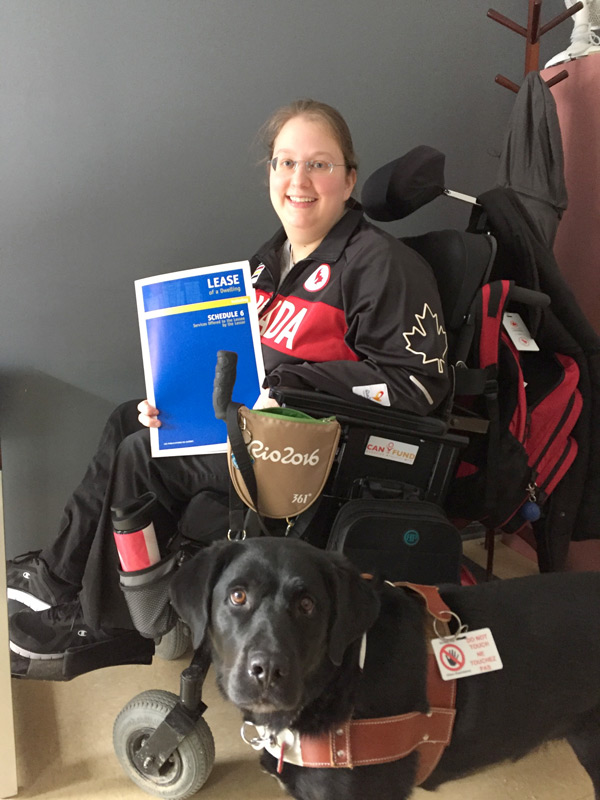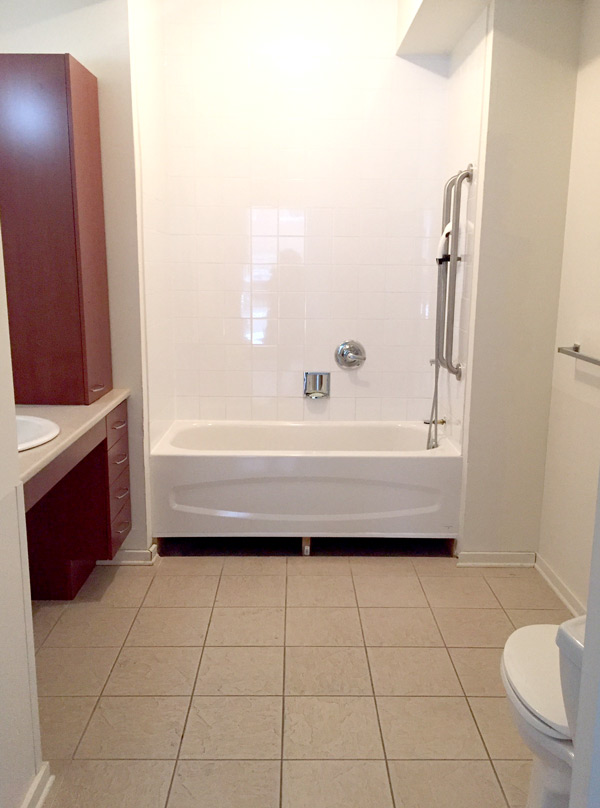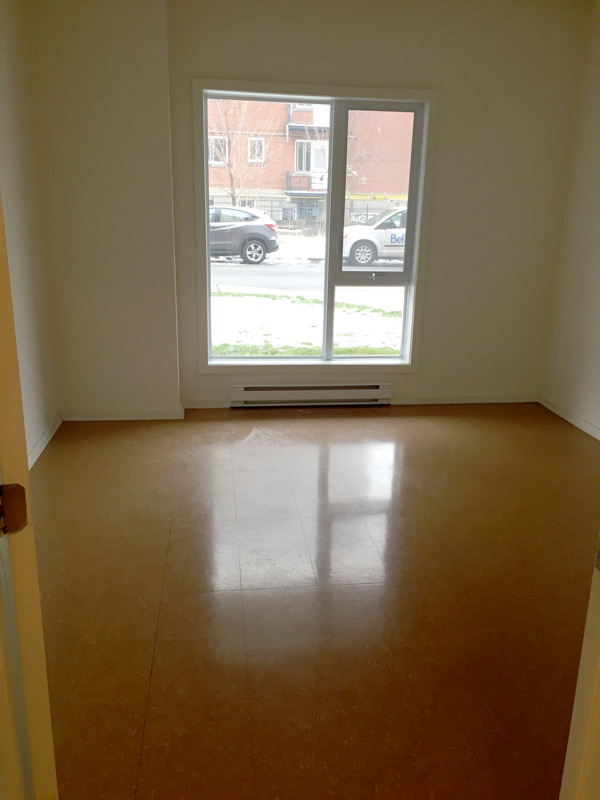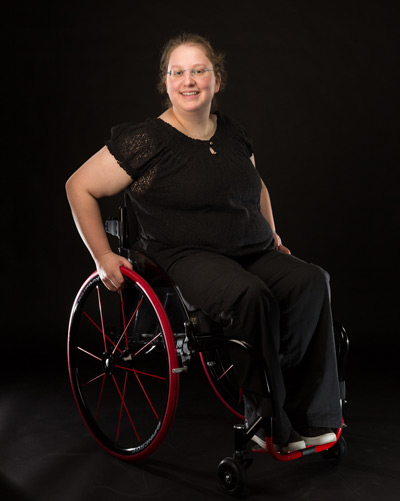Moving out from your parents' home is a rite of passage for almost everyone. For some, they can't wait to get out there on their own. Others prefer to stay as long as possible until their parents force them out. For people with severe physical disabilities like me, moving out may seem impossible. For some of those people like me, it can be done!
For someone like me, the logistics involved in moving out are complicated and frightening. It's not as simple as finding an apartment, packing up your stuff and buying pizza and beer for friends to help you move. Firstly, I need a fully adapted apartment that I can afford. Secondly, I need underground parking (darn Montreal winters). Thirdly and most importantly, I need care. Currently my parents cook, clean, and help me with my physical needs. All that has to be set up before I move to ensure that I'll be safe and have my needs met (I hear eating is important). What will I do in case of emergency? I'll have Ghia, my trusty service dog, by my side but there is a limit to what she can do. Is this too complicated? Will I even be able to find a place what will work for me? Well, my first step was to start looking.
Miraculously I hit the jackpot immediately when I called my local rehabilitation center. They told me that there were two apartments available at a semi-autonomous living facility right here in Montreal. Fully adapted apartment, indoor parking, 24/7 support on site in case of emergency, three meals per day provided, cleaning and laundry included, and up to three hours per day of personal care. After a few months of ironing out all the details, the deed was done. I signed my lease. Whoa, I'm an adult! When did that happen?

Splash. I just took the plunge. But why? Why not stay where I'm comfortable? Why not keep the status quo where everything is already planned out and working well for me? Why take the risk? Is it the societal pressure of having to move out before you turn 30 or be considered a loser? Maybe. Is it because my parents are getting on my nerves? A bit. Mostly it's because I need to feel in control. Shocking true fact: my body doesn't do what I want it to. Because I have so little control over my body, I feel the need to control my environment. When you're living under someone else's roof, control can be hard to come by.

Although I have a great relationship with my parents who respect me as an adult and treat me as such, their bedroom is still right across the hall from mine, and we share the same space and eat the same meals. I want to live by myself and set the thermostat to a temperature I like. I want to sleep in on weekends and not be awoke by noisy footsteps. I want the phone to ring and know it's for me (except the telemarketers, they can keep calling for my parents). I want to be as "normal" as a 26 year-old as I can be. Fear could have stopped me from looking for an apartment. Anxiety could have told me that it was just too big a risk. But doesn't everyone moving out of their parents' home for the first time feel those things although perhaps on a smaller scale? I'm not going to let my disability control another aspect of my life if it doesn't have to. I am in control.
I will probably be moving into my new place in May and I'm starting to panic a bit. I did not realize how much had to be done. I will be taking almost everything from my bedroom at home to my new place but I still have to buy many items to turn the apartment into my home. Window coverings, light fixtures, a futon, a bookcase, garbage cans, and every other little household object that has always been provided for me are now my responsibility. I have to set up cable and internet (because an addict needs her fix) and notify everyone of my change of address. This is stressful and that's so awesome. Wait, what? Did I just say that the stressful situation of moving was awesome? I sure did. This is a "normal" stress. It is a stress that has nothing to do with doctors, wheelchairs, medications, or any other aspect of living with a disability. I'm stressing over which color futon I should order and how I am going to decorate. I am stressing over the same things any other person moving out of their parents' home would and I take that as a good sign. If I'm stressing over the little things it means that I know I will be okay.

I have already made huge progress on my journey to independent living but this really is just the beginning. I invite you all to stay tuned as I document the transition via this blog. I'm excited for this next chapter in my life and thrilled to be able to share it with you.
Read Part 2 of Alison's blog here.
About the Author

Born and raised in Montral, Canada, Alison Levine is a proud Paralympian and member of the Canadian National Boccia Team. Boccia is a Paralympic sport of precision, concentration, and muscle control. She plays in the BC4 category which is for athletes with severe disabilities affecting the whole body, other than cerebral palsy. In her case, Alison has a degenerative neuromuscular disorder that cuases weakness in all her muscles. She appeared to be perfectly healthy when born but started exhibiting symptoms around the age of 12. Throughout the progression of her siability, Alison has played many adapted sports from wheelchair basketball, sledge hockey, and wheelchair rugby but now concentrates solely on boccia as it is physically the only sport suited for her level of disability.
Noted for her powerhouse strength and aggressive playing style, Alison quickly excelled at her new sport. Within three weeks of throwing her first ball, she was recruited to the provincial team, and within three months, she and her partner became the Canadian doubles champions. Within six months, she was selected to the national team. Now four years on, Alison is a staple on the national team. She has competed at every single international tournament since her selection to the team, and has rapidly climbed the ranks. She is now ranked second in Canada, and eighth in the world. While dealing with a debilitating condition that robs her of her independence, she makes the best of it. If it were not for her disability, Alison says, she would probably never have had the opportunity or honor to represent her country or get to spend her days playing a sport she loves.
Alison's ride is a Quickie QM-710 SEDEO
Most of the stories here on Live Quickie were submitted by readers. Do you have a story to tell? We'd love to hear it. Submit your story here.